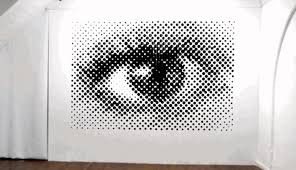AbsentEye

" …the long-banished philosopher, our long-lost best friend."
About a decade ago, while browsing in The Library of Congress, I happened upon a field of study I'd not previously encountered, The Philosophy of Science. I ordered up a pile of books on the subject to my study desk and over the following weeks, read through several of them. Since Descartes, the philosopher, once one of the principals of scientific enquiry, had been more or less banished from the laboratory in favor of more physically-oriented observers. The practice of I Think, Therefore I Am might be better characterized by the phrase I See, Therefore I Am. The philosopher might bring unseeable into the conversation, muddying otherwise clear inquiry. Heck, the philosopher might rail on about the nature of 'is-ness' itself, seemingly endlessly questioning the very base of observation as the principle tool of enquiry. Objective assessment nudged out the subjective. ©2018 by David A. Schmaltz - all rights reserved
I over-simplify, for living, breathing, thinking, actively observing people populated the ranks of science, and so the philosophical never fell too far beneath the surface, like one of those public secrets needing no confirmation or commentary. By the nineteen fifties, some real questions became more prominent as the notion of quantumness began to more firmly sink in. Where what we see increasingly seemed to be more of the quality of persistent illusion than absolute fact, some science writers began to question the validity of science writing. Could a scientist ever definitively state what is without undermining the credibility of the very assertion? In a seminal piece entitled To Be Or Not (Thanks for finding the link, Lynn), a small group of science writers posited a more reliable way of writing about scientific enquiry and judgement. They suggested banning the word 'is' from the journals, insisting that it could not possibly accurately describe any phenomenon. From their perspective, the fundamental translation of 'is', in scientific terms, must certainly be 'is not,' a dandy paradox.
Consider what 'is-less' writing might require. It might insist that the cold-blooded objective observer out himself, showing up rather than lurking along some adjacent tree line. The etherial 'we' might need definition, never able to magisterially stand anonymously proclaiming. In science writing, it might insist that the philosopher return to the laboratory and that every investigator assume full responsibility for maintaining the integrity of the philosophy of science as an integral part of the observing and testing work. I considered for myself, not just the ramifications of ditching 'is' from my writing, but the subtle, often unassessed costs of including such likely unwarranted certainty in my own work. Today, when I parse my own body of work since then, 'seems like' and 'perhaps' and 'might be' might be my most frequently-used modifiers. I can't any longer seem to simply declare something without insisting that I include the observer, myself, in the characterization.
What could this perspective possibly have to do with my consideration of cluelessness? When a newspaper headline declares that some study 'says' or 'shows' something, I sense a creeping is-ness within the characterization because the philosophy of science seems to suggest that studies never, ever say or show anything. By design, they simply could not. A scientific study cannot definitively show though one might well suggest, with some level of uncertainty, some benefit of the undoubtable doubt inherent to any statistical inference. So it seems to be with our own non-scientific observations. Just because I observe something doesn't quite impart any sort of immutability to that observed thing. I can definitively declare that it feels cooler today to me without needing to go all God-like and insist that 'it' 'is' 'colder', whomever 'it' might be.
Much seems ascribed to that mysterious 'it', and 'is' takes the rap for many self-deprecating observers. Be there! Be here, wherever that might be, or just shut up, I say to myself, for if I exclude myself as the chief observer, I leave my reader in the thoughtless hands of some pseudo-etherial nobody. My world seems richer for my studied omission of 'is' from my language, my characterizations seem livelier. I might not be any less clueless as a result, perhaps even more overtly clueless-appearing, but at least I seem to be owning my experience rather than failing to objectively report on it. I see even the venerable New York Times continue including the curious 'is' into some characterizations. Walter Cronkite used to end his popular nightly news broadcast with the phrase, "And that's the way it is," thereby negating whatever he might have intended that to mean. If we inhabit a universe seemingly ruled by probability and possibility, 'is' might be our mortal enemy and the long-banished philosopher, our long-lost best friend.


